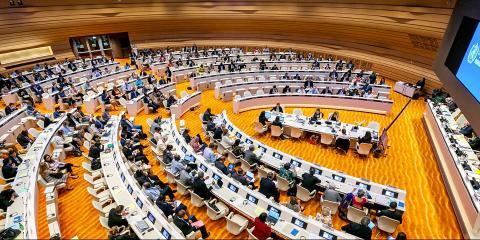The US House of Representatives on Tuesday unanimously passed a bill that would see Washington’s efforts to help Taipei regain observer status in the WHO included in an annual report by the US secretary of state.
Bill H.R. 353 was passed by a voice vote without objection, the Taipei Economic and Cultural Representative Office in Washington said.
The bill was introduced earlier this month by US Representative Ted Yoho, who serves as chairman of the Asia and Pacific Subcommittee under the House Committee on Foreign Affairs, and cosponsored by US representatives Eliot Engel, Michael McCaul, Steve Chabot and Brian Fitzpatrick.

Photo: WHO
A similar bill was last year passed by the US House of Representatives, but it did not make it onto the agenda of the US Senate before new legislators were sworn in on Jan. 3.
The version of the bill submitted by Yoho says that Taiwan did not receive an invitation to the World Health Assembly (WHA) in either 2017 or last year due to increased resistance from the People’s Republic of China, after having attended the annual assembly as an observer from 2009 to 2016.
“Taiwan remains a model contributor to world health, having provided financial and technical assistance to respond to numerous global health challenges,” the bill says.
Taiwan has since 1996 invested about US$6 billion in international medical and humanitarian aid efforts in more than 80 countries, it adds.
Although the US Congress has established a policy of support for Taiwan’s participation in international bodies that address shared transnational challenges, including the WHO, Interpol and the International Civil Aviation Organization, the bill says that “since 2016, Taiwan has not received an invitation to attend any of these events as an observer.”
The bill stipulates that an account of the changes and improvements made by the US in endorsing and attempting to obtain observer status for Taiwan at the WHA be included in an annual report by the US secretary of state, as is required by US Public Law 108-235, which was passed in 2004 to address Taiwan’s WHO participation.
In a news release yesterday, the Ministry of Foreign Affairs welcomed the bill’s passage and expressed its gratitude to the US House of Representatives for its support.
“Taiwan has made concrete contributions to combating epidemics and safeguarding global public health, and we are of indispensable significance,” the ministry said, pledging to do its utmost to secure an invitation to this year’s WHA, which is to be held from May 20 to May 28 in Geneva, Switzerland.
The Presidential Office also welcomed the move, thanking the US and other like-minded nations for their continuous support and assistance as Taiwan faces nonstop Chinese oppression.

Right-wing political scientist Laura Fernandez on Sunday won Costa Rica’s presidential election by a landslide, after promising to crack down on rising violence linked to the cocaine trade. Fernandez’s nearest rival, economist Alvaro Ramos, conceded defeat as results showed the ruling party far exceeding the threshold of 40 percent needed to avoid a runoff. With 94 percent of polling stations counted, the political heir of outgoing Costa Rican President Rodrigo Chaves had captured 48.3 percent of the vote compared with Ramos’ 33.4 percent, the Supreme Electoral Tribunal said. As soon as the first results were announced, members of Fernandez’s Sovereign People’s Party

EMERGING FIELDS: The Chinese president said that the two countries would explore cooperation in green technology, the digital economy and artificial intelligence Chinese President Xi Jinping (習近平) yesterday called for an “equal and orderly multipolar world” in the face of “unilateral bullying,” in an apparent jab at the US. Xi was speaking during talks in Beijing with Uruguayan President Yamandu Orsi, the first South American leader to visit China since US special forces captured then-Venezuelan president Nicolas Maduro last month — an operation that Beijing condemned as a violation of sovereignty. Orsi follows a slew of leaders to have visited China seeking to boost ties with the world’s second-largest economy to hedge against US President Donald Trump’s increasingly unpredictable administration. “The international situation is fraught

MORE RESPONSIBILITY: Draftees would be expected to fight alongside professional soldiers, likely requiring the transformation of some training brigades into combat units The armed forces are to start incorporating new conscripts into combined arms brigades this year to enhance combat readiness, the Executive Yuan’s latest policy report said. The new policy would affect Taiwanese men entering the military for their compulsory service, which was extended to one year under reforms by then-president Tsai Ing-wen (蔡英文) in 2022. The conscripts would be trained to operate machine guns, uncrewed aerial vehicles, anti-tank guided missile launchers and Stinger air defense systems, the report said, adding that the basic training would be lengthened to eight weeks. After basic training, conscripts would be sorted into infantry battalions that would take

GROWING AMBITIONS: The scale and tempo of the operations show that the Strait has become the core theater for China to expand its security interests, the report said Chinese military aircraft incursions around Taiwan have surged nearly 15-fold over the past five years, according to a report released yesterday by the Democratic Progressive Party’s (DPP) Department of China Affairs. Sorties in the Taiwan Strait were previously irregular, totaling 380 in 2020, but have since evolved into routine operations, the report showed. “This demonstrates that the Taiwan Strait has become both the starting point and testing ground for Beijing’s expansionist ambitions,” it said. Driven by military expansionism, China is systematically pursuing actions aimed at altering the regional “status quo,” the department said, adding that Taiwan represents the most critical link in China’s